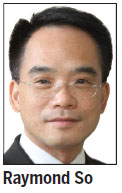Protests will leave deep scars in Hong Kong SAR
Updated: 2014-10-02 07:27
By Raymond So(HK Edition)
|
|||||||||
This week newspapers around the world reported the dramatic protests in Hong Kong. I am a professor, and whenever I meet someone now, they ask the same questions: Do your students boycott classes? Are they joining the "Occupy Central" campaign?
My answers are simple: Every school has students boycotting classes and students joining the protests. This is just the reality of the current situation.
In this atmosphere, it is not easy to stay neutral and be objective when discussing such contentious issues. Young people have strong views and many are expressing them through activism. This can lead to confrontations which can get out of control.
So when police used tear gas on Sunday, some sections of the public became more sympathetic to the protesters. Although the police have legitimate reasons to use reasonable force to maintain law and order, some people believe the use of tear gas is excessive.
Somehow the situation has reached a point of no return and the outlook for the future remains uncertain.

The National People's Congress Standing Committee (NPCSC) has laid down firm guidelines and principles in regard to the 2017 election for the Chief Executive. From a legal standpoint, the NPCSC decision is final. This is a reality which Hong Kong has to face.
Naturally, the NPC's conclusions will not please everyone - particularly people who are idealists. Now, those people who are unhappy with this decision certainly have the right to voice their views. However, they need to remember that it was made by the national authorities. The local authorities do not have the power to overrule it. This is something which we cannot change.
The most rational thing to do is to have informed discussions among the different stakeholders. Such discussions should be carried out within the legal framework set by the NPCSC. They should aim at encouraging agreement among the different groups.
However, this is now becoming less likely. The opposition camp has clearly demonstrated its intransigence on the issue. The current mass protests have made it impossible for the opposition camp to return to the negotiating table.
With a series of elections scheduled in the near future, the opposition camp is now at a point of no return. If they return to negotiations, they will be seen as weak and not resolute in their position. The pressure of future elections will only make the opposition camp persist with their current stance.
This is a real dilemma for Hong Kong.
People know the SAR government needs to submit the second round of political reform documents to the Legislative Council. Given what has happened in the past few days, the government has decided to delay this. The government realizes there is no chance, at present, to get it endorsed by the lawmakers.
The current situation is not the right time. With emotions running high, it is unlikely there can be any rational and informed discussions for some time. When the political climate becomes less tense then more sensible dialogue can occur. This will take time, but it will also rest on the assumption that the current situation will not get any worse.
From the previous poll results, even though the public may not be totally happy with the NPCSC's decision, the majority view is that the arrangement is already an improvement on previous elections. There is also a balancing voice against the "Occupy Central" movement.
But the developments in the past few days have just turned the situation around. It will take quite some time for emotions to die down. The sad thing, however, is that there are now deep wounds in Hong Kong society. Even though these wounds may eventually heal, the scars will remain.
Apart from political reforms, the government also has other serious issues to confront.
It still has to resolve the problems relating to housing, land supply, economic development, education and energy. The government has plans to deal with these issues and there is already a lot of work in the pipeline. But it is possible that the government will find it harder to get the necessary endorsements for relevant policies in future.
The road ahead is full of difficulties. These will be a great challenge for our political leaders.
The author is dean of the School of Business at Hang Seng Management College.
(HK Edition 10/02/2014 page4)